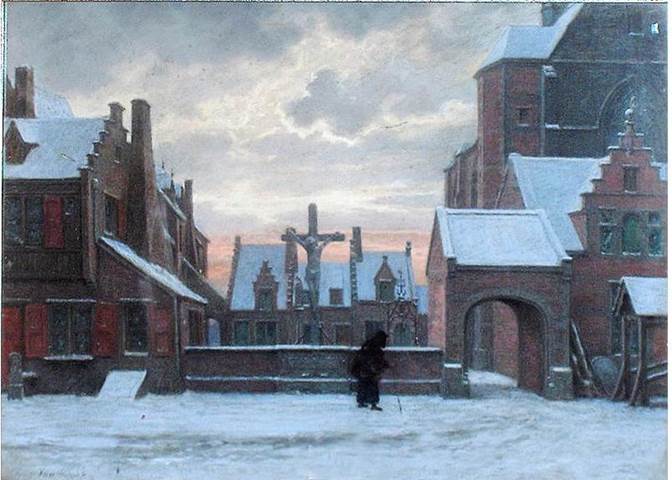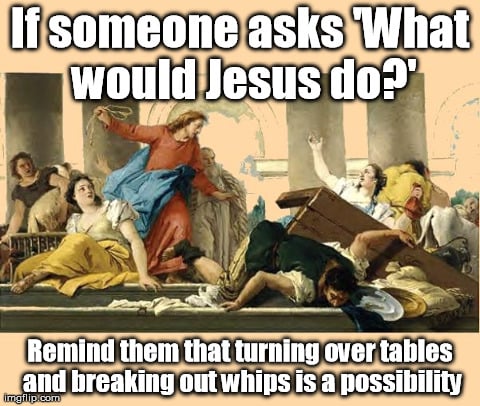On Luke 18:18-27
When I was a small boy, our priest told us how, when he was a small boy, the people would go to church no matter what. It didn't matter if the snow was deep or the roads were slick, the people would brave the weather and go to church because nothing was more important than the church and being there to worship the Lord.
 |
| Trudging Through the Snow by Van Kuyck |
This impressed me very much as a small boy. And so I was excited the next time there was a snow storm and I got the opportunity to test my mettle. The snow was deep and the wind was blowing yet still I trudged on to the church that Sunday morning against it all. We lived close enough to the church to walk in those days. It felt like an adventure. It was difficult but it was worth it – because it was for the Lord! However, when I got to the church, I saw that few had come. And I thought, Well! We can see who the good Catholics are!
But today Jesus tells the ruler that “No one is good but God alone” (Luke 18:19), not even the Catholics who have braved the bad weather to get to church.
All the time, I hear people say, “I’m a good person. I’ll go to heaven because I’m a good person.” Really? A little humility would help us. If we think we’re already there, we’ve got a long way to go.
If you want to enter the Church of the Nativity in Bethlehem to venerate the place where Jesus was born, they tell me you must enter through what they call the “Door of Humility.” It’s so low that you have to bow to enter. This is a good symbol of the fact that there is no access to the birth of Christ in our hearts without humility. Jesus himself is the model of humility - the very God entering into this world as a little baby.
And now here is Jesus who (I don’t care how good you may be, you’re not as good as he is, and) when somebody calls him, “Good teacher,” he retorts, “Why do you call me good? No one is good but God alone.” In other words, if you’re calling him good, you’re calling him God. That’s the answer to his question, “Why do you call me good?” Because he is the Lord God – that’s why.
All this talk of goodness and who is good is important to the ruler’s question, “What shall I do to inherit eternal life?” Because there is only one way to life – to be united to the one who is good and is life.
But the ruler seems to think the way to life is by doing something. He asks Jesus, “What shall I do to inherit eternal life?” This is also what people usually have in mind when they audaciously say, “I’m a good person.” What they mean is, “I haven’t killed anybody.”
There are things we must do, of course, and Jesus lists them. We must keep the commandments. And, when we do not from time to time, let us repent in the holy mystery of repentance. Spending a lifetime away from confession is surefire way into hell, I can tell you, and a destroyer of humility.
But even before Jesus lists the commandments, he says that “no one is good but God alone.” This reveals to us that perhaps goodness may be less about doing and more about being.
The Lord is good. Goodness is his name. As the psalm says, "Praise the Lord, for the Lord is good, sing praises to his name for it is beautiful.” (Psalm 134.3).
God is not good simply because he chooses or wills to align himself with some abstract standards or principles of goodness or morality. God is goodness himself and the source of all goodness. He is good himself just as he is love himself. He is good in his being, his essence, his nature. Good is a name for who he is.
As with all the names of God, this name is only an analogy. The essence of God is beyond us, beyond being, beyond all names, and beyond knowing. If someone claims to fully understand the mystery of God in himself, be assured that they are insane.
Yet, paradoxically, we can know God somehow, can't we? We do have these names for God, given to us by God himself – good and light and beautiful and love and ecstasy and zeal (The Divine Names, Pseudo-Dionysius). Jesus himself calls God good as did the inspired psalmist before him.
We know that God is good by our own experience of goodness.
The ruler in today's gospel lacks perfection, but even he is able to see that Jesus is good and can teach him the way to life. However, he needs Jesus to teach him that God is the only good one and the source of all goodness.
Perfect goodness cannot be attained by simply following the rules – though following God’s commandments by the grace of God is essential. Rather we are good to the extent that we participate in the goodness of God and we live to the extent that we live the life of God.
All the things that God has created are good. God, who is good, is the ground of all being – so everyone who is and has being partakes of his goodness.
One of my professors, Father Jonathan Tobias, writes, "We know God's goodness because goodness, too, is part of our created nature. We are 'analogous' to God: He is infinitely beyond us, and He is Creator while we are creature. But still, his design for goodness in us resonates with his transcendent goodness."
What good can we do in response to this goodness of God? How can we not do as the psalm says and "sing praises to his name?" That is why we gather here to celebrate liturgy together day after day and week after week – not just to puff ourselves up or to keep out of hell – but to sing praises to his name.
When asked what we are supposed to get out of liturgy, Father Robert Taft, of blessed memory, replied, "What you get out of the liturgy is the privilege of glorifying almighty God. If you think it's about you, stay at home. It's not about you. It is for you, but it's not about you.... John says quite clearly that Jesus is the important one: ‘He must increase, I must decrease.’ He must increase, I must decrease. Everybody needs to hear that. It's not about me, it's not about you. It's about something infinitely more important than us."
My dear brothers and sisters in Jesus Christ, we are not God. You are not God and I am not God. Jesus says that God alone is good. Let us stop, then, acting like we can make ourselves good by our own power. Give up! Surrender! Let us turn to God instead, who alone can make us good.
We can do nothing apart from the grace of God. Jesus shows the ruler that the beginning of the way to eternal life is to keep the commandments. But even this we cannot do apart from the grace of God.
The ruler had kept these commandments – Jesus does not deny it. So God must have been with him all along. Let me tell you, God is with us all. To the extent that we exist at all, and certainly to the extent that we are good, God is in us. We are all at all times and in all places in God's hands.
Left in our hands, our salvation would be impossible, but with God all things are possible (Luke 18:27; Matt 19:26). Of myself, I cannot do anything. God can do anything. Through God, with God, and in God, I can do anything (cf. Phil 4:13). Apart from God, without God, outside of God, I can do nothing.
We are weak, but he is strong.
We are powerless. Only God is powerful.
We are overrun with many inadequacies, weaknesses, addictions, resentments, and sins. Things and people lord over us, replace God in our hearts, become idols. These things – whatever they are for us personally – can become obstacles between us and the only good one. They can disrupt our prayer of praise to the source of all goodness.
We ought to bask always in the light of his goodness, the way that a sunflower follows the sun.
One of the images of the Good that my favorite theologian, Pseudo-Dionysius, offers us is the sun. He writes, "The great, shining, ever-lighting sun is the apparent image of the divine goodness, a distant echo of the Good. It illuminates whatever is capable of receiving its light and yet it never loses the utter fullness of its light."
If we would strive for the perfection he calls us to – asking the Lord, "what do we still lack?" – we must remove every obstacle that exists between us and God – even if they are good things – like the riches of the ruler. If we have many riches burdening our hearts, let us give them away. If we're over-focused on other good things or people, let us renew our focus on the Lord.
More than by our own moral striving, we will grow in likeness to the Lord by basking in the light of his glory and praising his name without ceasing. All goodness comes from him. He is the only one who is good.













